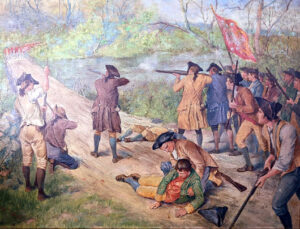Special to WorldTribune.com
By Bill Federer, April 19, 2024
“To disarm the people is the best and most effectual way to enslave them.” — George Mason of Virginia
In April of 1775, the British Royal Military Governor of Massachusetts, General Thomas Gage, sent 800 British Army Regulars, under the command of Lieutenant Colonel Francis Smith, on a preemptive raid to seize guns from American patriots at Lexington and Concord.
As the sun rose, April 19, 1775, there were 800 British regulars approaching Lexington’s town green.

To their surprise, they were met by Lexington’s militia, comprised of 77 men who were mostly members of the Church of Christ, pastored by Rev. Jonas Clark, whose wife was a cousin of John Hancock.
Patriot captain John Parker told the militia: “Stand your ground; don’t fire unless fired upon, but if they mean to have War, let it begin here!”
It is disputed who fired first, but the British opened fire and killed or wounded eighteen of Captain Parker’s men. …
The American militia retreated, growing to number 400, and took a stand at Concord’s Old North Bridge.
The British fired first, wounding four and killing two. Militia commander John Buttrick yelled: “Fire, for God’s sake, fellow soldiers, fire!”
Taking many casualties, the British began a hasty retreat 20 miles back to Boston, being ambushed along the way by John Parker’s militia in “Parker’s Revenge.”
Tragically, in the anger of their retreat, the British shot or bayoneted almost everyone in the town of Menotomy.
[Earlier a warning had been sent] … from Boston’s Old North Church that the British were coming, as recounted in Henry Wadsworth Longfellow’s poem, “Paul Revere’s Ride”:Listen my children and you shall hear
Of the midnight ride of Paul Revere,
On the 18th of April, in 75;
Hardly a man is now alive
Who remembers that famous day and year.
… He said to his friend, ‘If the British march
By land or sea from the town to-night,
Hang a lantern aloft in the belfry arch
Of the North Church tower as a signal light …
One if by land, and two if by sea;
And I on the opposite shore will be,
Ready to ride and spread the alarm
Through every Middlesex village and farm,
For the country folk to be up and to arm …
Through the gloom and the light,
The fate of a nation was riding that night;
And the spark struck out by that steed, in his flight.”
Henry Wadsworth Longfellow continued:
You know the rest. In the books you have read
How the British Regulars fired and fled,—
How the farmers gave them ball for ball,
From behind each fence and farmyard wall,
Chasing the redcoats down the lane,
Then crossing the fields to emerge again
Under the trees at the turn of the road,
And only pausing to fire and load.”
So through the night rode Paul Revere;
And so through the night went his cry of alarm
To every Middlesex village and farm,—
A cry of defiance, and not of fear,
A voice in the darkness, a knock at the door,
And a word that shall echo for evermore!
For, borne on the night-wind of the Past,
Through all our history, to the last,
… In the hour of darkness and peril and need,
The people will waken and listen to hear
The hurrying hoof-beats of that steed,
And the midnight message of Paul Revere.
Though it took eight long years, Americans won their independence. ….
Two months after the Battles of Lexington and Concord, the Continental Congress, under President John Hancock, declared, June 12, 1775:
“Congress … considering the present critical, alarming and calamitous state … do earnestly recommend … a Day of Public Humiliation, Fasting and Prayer, that we may with united hearts … confess and deplore our many sins and offer up our joint supplications to the All-wise, Omnipotent and merciful Disposer of all Events, humbly beseeching Him to forgive our iniquities …
It is recommended to Christians of all denominations to assemble for public worship and to abstain from servile labor and recreations of said day.”
A century later, on April 19, 1875, at that same Old North Bridge, patriots were honored by the dedication of the “Minute Man Statue” designed by Daniel Chester French.
On the statue’s base is a stanza of the poem The Concord Hymn, written Ralph Waldo Emerson, April 19, 1860:
By the rude bridge that arched the flood,
Their flag to April’s breeze unfurled;
Here once the embattled farmers stood;
And fired the shot heard round the world. ….
Patriots had prepared for this with the Massachusetts Provincial Congress, October 26, 1774, organizing their defenses with one-third of their regiments being “Minutemen,” men who were ready to fight at a minute’s notice.
This idea came from the Bible, where in Ancient Israel every man was armed and ready to defend his family and community.
